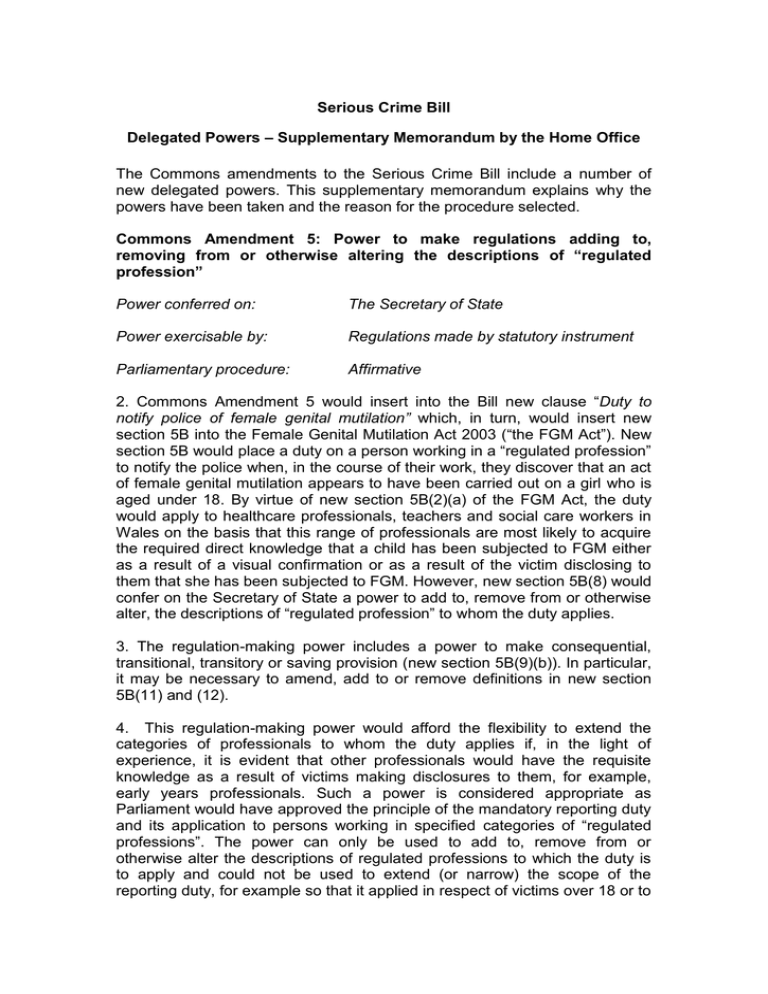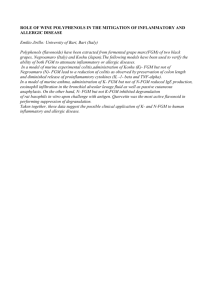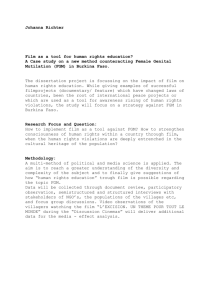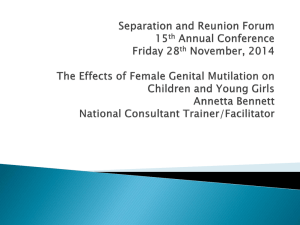Serious Crime Bill – Supplementary Memorandum by the Home Office Delegated Powers
advertisement

Serious Crime Bill Delegated Powers – Supplementary Memorandum by the Home Office The Commons amendments to the Serious Crime Bill include a number of new delegated powers. This supplementary memorandum explains why the powers have been taken and the reason for the procedure selected. Commons Amendment 5: Power to make regulations adding to, removing from or otherwise altering the descriptions of “regulated profession” Power conferred on: The Secretary of State Power exercisable by: Regulations made by statutory instrument Parliamentary procedure: Affirmative 2. Commons Amendment 5 would insert into the Bill new clause “Duty to notify police of female genital mutilation” which, in turn, would insert new section 5B into the Female Genital Mutilation Act 2003 (“the FGM Act”). New section 5B would place a duty on a person working in a “regulated profession” to notify the police when, in the course of their work, they discover that an act of female genital mutilation appears to have been carried out on a girl who is aged under 18. By virtue of new section 5B(2)(a) of the FGM Act, the duty would apply to healthcare professionals, teachers and social care workers in Wales on the basis that this range of professionals are most likely to acquire the required direct knowledge that a child has been subjected to FGM either as a result of a visual confirmation or as a result of the victim disclosing to them that she has been subjected to FGM. However, new section 5B(8) would confer on the Secretary of State a power to add to, remove from or otherwise alter, the descriptions of “regulated profession” to whom the duty applies. 3. The regulation-making power includes a power to make consequential, transitional, transitory or saving provision (new section 5B(9)(b)). In particular, it may be necessary to amend, add to or remove definitions in new section 5B(11) and (12). 4. This regulation-making power would afford the flexibility to extend the categories of professionals to whom the duty applies if, in the light of experience, it is evident that other professionals would have the requisite knowledge as a result of victims making disclosures to them, for example, early years professionals. Such a power is considered appropriate as Parliament would have approved the principle of the mandatory reporting duty and its application to persons working in specified categories of “regulated professions”. The power can only be used to add to, remove from or otherwise alter the descriptions of regulated professions to which the duty is to apply and could not be used to extend (or narrow) the scope of the reporting duty, for example so that it applied in respect of victims over 18 or to suspected victims in any age group. The power to extend the categories of regulated professionals to whom the duty is applied is therefore narrowly drawn, albeit that the power could, in principle, be used to apply the duty to any class of person operating in a professional capacity and subject to some level of regulation (for example, youth workers). 5. By virtue of new section 5B(10) of the FGM Act, the regulation-making power is subject to the affirmative procedure. This is considered appropriate given the ‘Henry VIII’ nature of the power. It also recognises that in adding the new clause to the Bill Parliament will have agreed a particular set of regulated professions to whom the duty should apply and will ensure that both Houses have the opportunity to consider and approve any changes to the range of regulated professionals before such changes can take effect. Commons Amendment 6: Power to issue guidance in relation to the Female Genital Mutilation Act 2003 Power conferred on: Secretary of State Power exercisable by: Statutory Guidance Parliamentary procedure None 6. The FGM Act already provides for offences in relation to FGM. Clauses 69 to 72 of the Bill make a number of amendments to the FGM Act to further strengthen the criminal and civil law to tackle FGM. These provisions extend the extra-territorial reach of the offences in the FGM Act so that they apply to offences involving habitual (as well as permanent) UK residents; introduce a new offence of failing to protect a girl at risk of FGM, grant lifelong anonymity to victims, and provide for a civil order (the FGM protection order) to protect potential victims. And, as indicated above, new clause “Duty to notify police of female genital mutilation“ further amends the FGM Act to place a duty on specified regulated professionals to notify the police when, in the course of their work, they discover that an act of FGM appears to have been carried out on a girl who is aged under 18. To complement these provisions, Commons Amendment 6 would insert new section 5C into the FGM Act which would enable the Secretary of State to issue guidance about any of the provisions in the FGM Act, as amended, or other matters relating to FGM. In preparing the guidance, the Secretary of State would be under a duty to consult the Welsh Ministers so far as the guidance is to a body exercising devolved Welsh functions, and such other persons as she considers appropriate. Persons exercising public functions to whom the guidance is given will be under a duty to have regard to the guidance when exercising such functions. 7. The intention is to place relevant aspects of the existing multi-agency practice guidelines on FGM1, updated to reflect the provisions in the Bill, on a 1 Available at: https://www.gov.uk/government/uploads/system/uploads/attachment_data/file/380125/MultiAg encyPracticeGuidelinesNov14.pdf statutory footing. That guidance provides information on identifying when a girl or young women may be at risk of FGM and responding appropriately to protect them, identifying when a girl or young women has been subjected to FGM and responding appropriately to support them, and measures that can be implemented to prevent the practice of FGM. The revised guidance would detail the changes to the FGM Act and, in particular, provide information on applying for FGM protection orders and complying with the statutory duty to report known cases of FGM against girls and young women under 18. Placing the existing guidance on a statutory footing would help promote awareness amongst public authorities of the strategies and powers available to them to tackle FGM. 8. Any guidance issued under new section 5C of the FGM Act would not be subject to any parliamentary scrutiny, on the grounds that it would provide practical advice on the application of the legislative provisions and would be worked up in consultation with all interested stakeholders and practitioners. The guidance will not conflict with, or alter the scope of, the criminal offences or civil powers in the FGM Act, as amended. Moreover, whilst a person exercising public functions will be required to have regard to the guidance when exercising those functions, the guidance will not be binding to the extent that this requirement falls short of a duty to follow the guidance. The approach taken in the new clause is consistent with other legislative provisions providing for statutory guidance, in particular section 63Q of the Family Law Act 1996 in relation to forced marriage. Commons Amendment 8: Power to issue guidance in relation to new offence of controlling or coercive behaviour in intimate or family relationships Power conferred on: Secretary of State Power exercisable by: Statutory Guidance Parliamentary procedure None 9. Commons Amendment 8 would provide for a new domestic abuse offence. The new clause (“Controlling or coercive behaviour in an intimate or family relationship”) sets out the elements of the new offence. In appropriate cases certain terms used in the construction of the offence are defined in the legislation, for example the term “members of the same family”, while others, such as “controlling or coercive” are left undefined and will take their ordinary meaning. In the normal way, it will be a matter for a jury or magistrates to determine whether, on the facts of a particular case, the offence has been made out. That said, the Government sees the merit in providing guidance to the police to accompany the new offence to assist police forces in understanding and investigating the new offence, and in giving statutory underpinning to such guidance. Statutory guidance is also expected to be of value to third sector organisations and others working in the field of domestic abuse. Accordingly, new clause “Guidance”, inserted by Commons Amendment 8, would confer a power on the Secretary of State to issue guidance to whatever persons she considers appropriate concerning the investigation of the new offence. This is accompanied by a power to revise any guidance which is issued, and a duty to arrange for any guidance that is issued or revised to be published. Amongst other things, such guidance would provide examples of the kind of behaviours that might be considered to be controlling or coercive when the offence is being investigated. 10. Any guidance issued under the new clause would not be subject to any parliamentary scrutiny, on the grounds that it would be worked up in consultation with all interested stakeholders and practitioners. The guidance will not conflict with, or alter the scope of, the new criminal offence, which will itself be the subject of parliamentary scrutiny during the passage of this Bill. And finally, new clause “Guidance” does not impose any obligation on any named public authorities or individuals to follow the new statutory guidance. The approach taken in the new clause is consistent with other legislative provisions providing for statutory guidance, for example, section 63Q of the Family Law Act 1996 in relation to forced marriage and sections 19, 32, 41, 56, 73 and 91 of the Anti-social Behaviour, Crime and Policing Act 2014 in respect of powers for tackling anti-social behaviour. Commons Amendment 10: Power to make regulations conferring power on a court to order a communications provider to disconnect a mobile phone in use in prison without authorisation Power conferred on: The Secretary of State and the Scottish Ministers Power exercisable by: Regulations made by statutory instrument Parliamentary procedure: Affirmative 11. New clause “Prevention or restriction of use of communication devices by prisoners etc”, inserted by Commons Amendment 10, would confer on the Secretary of State (in relation to England and Wales) and the Scottish Ministers (in relation to Scotland) a power to make provision by regulations conferring power on a court to make a “telecommunications restriction order”. This is an order which would require a communications provider to take whatever action the order specifies for the purpose of preventing or restricting the use of a mobile phone (or other communications device) in a prison where the use of the phone is unauthorised. The new clause sets out what regulations must make provision about (subsection (3)) and what they may make provision about (subsection (4)). It also defines certain terms, such as “communications provider” (subsection (8)). 12. Mobile phones in prisons are associated with numerous crimes, including the illicit supply of drugs and other organised crime. There are a number of offences relating to the use of mobile phones in prisons without authorisation. These can be found in the Prison Act 1952 (for England and Wales). Similar offences exist for Scotland. Section 40D(1) of the Prison Act 1952 creates the offence of taking a photograph or making sound recordings in a prison or transmitting any image or sound by electronic communications. Section 40D(3) creates offences designed to prohibit the conveyance or transmission of restricted documents out of a prison. Section 40D(3A) creates an offence in relation to the possession of, inter alia, a mobile phone, without authorisation. 13. ‘Authorisation’ for the purposes of section 40D of the Prison Act 1952 is defined in section 40E of that Act and means authorisation given for the purposes of that section in relation to all prisons or prisons of a specified description, by prison rules or by the Secretary of State; and in relation to a particular prison— by the Secretary of State; by the governor or director of the prison; by a person working at the prison who is authorised by the governor or director to grant authorisation on his behalf. 14. The Prisons Rules 1999 provide for powers of confiscation of unauthorised articles: ‘43(5) The governor may confiscate any unauthorised article found in the possession of a prisoner after his reception into prison, or concealed or deposited anywhere within a prison.’. 15. Detection technology and cell and prisoner searches are currently used to identify and seize phones in prison. However, many of the phones in question are not found resulting in few prosecutions and relatively few confiscations. 16. Although communications providers may be able to disconnect the phones in question in accordance with the terms and conditions attached to usage, this is not certain. Consequently, the Government considers it necessary to make bespoke provision via regulations where a court can order the communications provider to disconnect the phone. 17. The Government considers that it is appropriate to put the detail pertaining to this measure into regulations, since some of it will necessarily be technical in nature. As technology evolves, and new equipment becomes available, it may for instance be necessary to update the detection to disconnection process. Technology has a limited lifespan and therefore, by including technical details about the process in regulations as opposed to on the face of the Bill, we are better placed to amend if required. Further, given that technology changes rapidly and that therefore it may be necessary to modify the provisions accordingly, it is more practicable to do this via secondary legislation. That said, whilst the scheme is to be set out in secondary legislation, the purpose of the scheme, namely to confer a power on the civil courts to require communication providers to take specified action to prevent or restrict the use of mobile phones by prisoners, is clearly set out on the face of the new clause (subsections (1) and (2)). Moreover, the new clause requires that any regulations must include certain core elements of the scheme (subsection (3)), including key safeguards in respect of rights to make representations and provision about appeals. Subsection (4) sets out matters about which the regulations may make provision. 18. Given that the scheme itself is to be set out in secondary legislation, and in order to ensure that the rights of those affected are fully considered, the Government considers that it is appropriate for the regulations to be subject to the affirmative procedure thereby ensuring that the details of the scheme must be debated and approved by both Houses (or, in Scotland, by the Scottish Parliament). Home Office 24 February 2015





